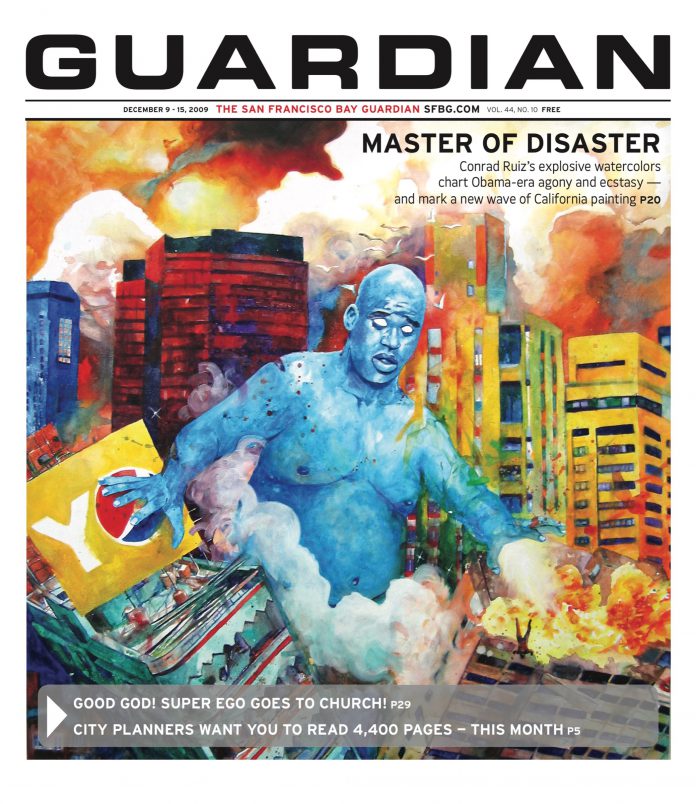steve@sfbg.com
GREEN CITY San Francisco’s top elected and appointed officials made the city a little greener — literally — Dec. 3. And they say the recent removal of restrictions on bicycle-related improvements will make San Francisco a lot greener over the long term.
A festive mood was in the air when officials and activists gathered at the intersection of Oak and Scott streets to paint the city’s first green bike box (marking a safe spot for cyclists to wait in front of cars at intersections) and celebrate the first bike lanes to be created in more than three years.
In the week since Superior Court Judge Peter Busch partially lifted an injunction that had banned all projects mentioned in the city’s Bicycle Plan — the court ruled that they needed to be studied with a full-blown environmental impact report, which the city completed earlier this year, although it has been challenged by another lawsuit set for trial in June 2010 — city crews worked at a blistering pace on bike improvements.
They created three new bike lanes (of the 10 Busch is allowing to move forward before the trial, holding up another 50 for now) and installed barriers between the bike and car lanes on Market Street near 10th Street. "So now we have the first separated bike lane in San Francisco," San Francisco Bicycle Coalition director Leah Shahum told the Guardian, happy over a safety improvement that encourages children and seniors to ride.
The crews also have been installing about five new bike racks and 20 shared traffic lane markings (known as "sharrows") each day. Mayor Gavin Newsom praised the rapid implementation and told the crowd, "You’re going to see more than you’ve seen in years be done in the next few months. The goal is to get from 6 percent of commutes in San Francisco up to 10 percent of all commutes by bicycle — and I think that is imminently achievable in the next few years."
Also on hand were Sups. Ross Mirkarimi, Bevan Dufty, and Sophie Maxwell, Department of Public Works head Ed Reiskin, San Francisco Municipal Transportation Agency (SFMTA) board chair Tom Nolan, and SFMTA director Nat Ford, who declared the goal of making "San Francisco the preeminent city for bicycling in North America."
Mirkarimi, the only elected official to ride a bicycle to the event, told the crowd: "This is a delightful day…. We are all unified in the mission statement of making San Francisco bike-friendly."
Dufty, who chairs the Transportation Authority and pushed for the rapid implementation plan, said, "There’s a really great community here. First, my hat’s off to the Bicycle Coalition and all of their thousands of members who really keep the city honest and keep us moving forward."
Nolan also praised bike activists who pushing his agency to prioritize bike projects and prepare for the end of the injunction: "It was a very effective campaign. You did such a great job at making your case."
While anti-bike activist Rob Anderson, who sued the city along with attorney Mary Miles, regularly derides the "bike nuts" as a vocal minority pushing an unrealistic transportation option, the event showed almost universal support for bicycling at City Hall.
"I can say this is the best relationship we’ve had for years with the advocacy community, with the Bicycle Coalition," Newsom said. "We’ve begun to strike a nice balance where this is not about cars versus bikes. This is about cars and bikes and pedestrians cohabitating in a different mindset."
Bicycling in San Francisco has increased by 53 percent in the last three years, so Shahum said the plan’s projects and the growing legion of bicyclists will help the city in myriad ways in coming years.
"We know we can do this," she said. "We know the climate change goals this city has laid out, the public health goals, the livability goals that the city has laid out, will not be met without shifting more trips to bicycling, walking, and transit. And that’s why this day is so important."
Or as Maxwell said, "This is a great opportunity for San Francisco to finally take its place among world cities that recognize that cars are not the only mode of transportation."

